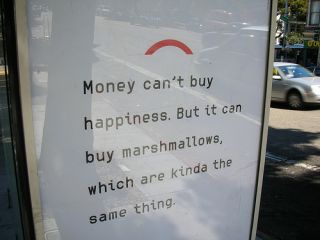Happiness
Savoring: Explaining the Happiness-Wealth Relationship
Recent research examines the ability to enhance and prolong positive experiences
Posted April 4, 2013

In the modern film classic National Lampoon’s Christmas Vacation (admittedly, I’m no film critic), Clark Griswald eagerly awaits his end-of-year bonus and plans to surprise his family with a new pool. As the days until Christmas tick by, the pool takes on a life of its own and Clark vividly anticipates its arrival, imagining himself cooling off in it in the summer months (replete with Christy Brinkley’s company). With Tax Day around the corner, my guess is that more and more people are similarly thinking about what they might be able to buy with their refund or what they could have bought if they didn’t owe more money to the government (enter sound of a sad trombone). Regardless of what boat you’re in, thinking about what sort of things or experiences new wealth might be able to get you is illustrative of the sometimes twisted relationship between money and happiness.
Indeed, in a recent post, I reviewed findings suggesting that more money doesn’t always lead to greater happiness. The bottom line? Richer countries have citizens who are more satisfied with their lives, but these folks are not necessarily happier. Some new research by Jordi Quoidbach, Elizabeth Dunn, and colleagues offers an intriguing explanation for why this link between money and happiness is relatively weak. The impetus of their work comes from a fancily-named theory by the psychologist Dan Gilbert: the experience-stretching hypothesis. Gilbert suggests that experiencing life’s more refined things (say, dining at the French Laundry in Napa or scuba-diving near Australia), may ironically dampen the pleasures that one gets from more banal experiences (taking a walk on the first day of spring, eating a great piece of chocolate, etc.).
Quoidbach, Dunn, and colleagues offer an intriguing reason for why this may be so. They suggest that when resources are scarce, people savor the limited experiences that they do have. Here, savoring means taking positive experiences and prolonging and enhancing them. Theorists have suggested that there are four components to savoring: showing nonverbal enjoyment, staying in the here and now while enjoying something, thinking about the event before as well as afterward, and telling others about the positive experience. For example, research shows that when college seniors are reminded of the short amount of time that they have left until graduation, they spend more time taking advantage of the activities and events that they anticipate missing. To this end, and in line with Gilbert’s experience-stretching hypothesis, Quoidbach and colleagues reasoned that if money can buy more frequent positive experiences, there may simply be less of a need to draw out and appreciate other good times. Having more wealth, in other words, might undermine the ability to savor good things in life.

As an initial examination of this idea, the researchers asked people to report their wealth and also gave them a questionnaire that measures savoring ability. They found a negative relationship: people with more money tended to be worse at savoring life’s pleasures. This is of course just a correlation, but in two clever follow-up experiments, Quoidbach and colleagues found evidence for a causal link between money and savoring. In one, research participants were shown a questionnaire that also had a picture of a stack of money on it (this is a technique that has been used successfully in other studies to get people into the mindset of thinking about money). People in a control condition were shown the same image, but it was blurred beyond recognition. Next, all participants filled out the “Savoring Positive Emotion Scale,” which presents six hypothetical scenarios meant to elicit feelings of contentment (e.g., finishing an important task), joy, awe (e.g., hiking and seeing a beautiful waterfall), excitement, pride, and gratitude. After each scenario, participants were given eight possible reactions and asked to indicate the ones they think would best characterize their typical response. Interestingly, the subjects who were exposed to the picture of money picked responses that were less indicative of the four components of savoring. In line with the earlier correlational result, thinking about money actually caused people to savor positive things in life less.
These results aren’t just relegated to self-reported savoring ability. In a follow-up study, Quoidbach and colleagues showed that reminding people of money made them savor a positive experience less on a behavioral level: participants in the “money” condition spent less time eating a piece of chocolate, and also showed significantly less enjoyment while eating the chocolate.
But the authors had also asked the research participants in the first study to report how much wealth they currently had as well as how happy they were. Replicating previous work, they found that there was a small, but significant link between happiness and wealth. They also found that there was a strong negative relationship between wealth and savoring (as discussed earlier). So, if happiness and wealth are weakly positively related, and wealth and savoring are negatively related, the possibility exists that savoring may actually “suppress” the relationship between happiness and wealth. Using regression models, researchers can examine whether the presence of one variable can actually enhance the relationship between two other variables (that is, whether it acts as a suppressor). Indeed, the relationship between happiness and wealth became significantly stronger when accounting for savoring ability. In plain English, there may in fact be a strong relationship between happiness and wealth, but only if we consider the ability of people to savor positive events. Yes, money can buy lots of good times, but without the tendency to savor those things, happiness won’t necessarily follow.
One thing that I find intriguing about this line of research is that it also potentially speaks to one of the reasons why people may be nostalgic for childhood and youth. Being younger, after all, means experiencing many novel things. And presumably, each of those new experiences is met with some degree of savoring (anticipation, excitement in the moment, discussion afterward, etc.). But as people move through life and more similar experiences are accrued, it becomes increasingly difficult to stop and appreciate each one as if it was novel again. Relatedly, such findings may help explain why older adults are happier than their younger counterparts. As time grows increasingly scarce, research has found that people tend to focus on emotional goals, rather than information-related goals. But it may also be the case that as people run out of time, they find more ways to savor the positive events that they do experience.


